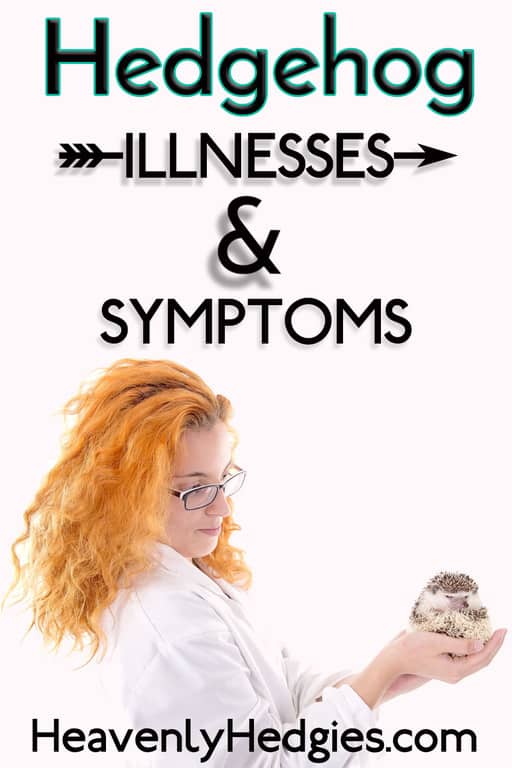Hedgehog illnesses and symptoms have been a topic of research since the African Pygmy, Algerian, and hybrids of the two species became popular pets. Since the 90's, hedgehogs have been studied by scientists, veterinarians, and breeders. Family lineages plus reported causes of death or illness have been documented with the mission to understand why and how illnesses occur. Many hedgehog illnesses and diseases are caused by environmental factors (such as pathogens and diet), or are inherited (through poor genes). Weighing and recording your hedgehog's weight weekly helps you recognize any changes that may signal an illness.
Information Disclaimer: We are not exotic pet veterinarians. Therefore, you should always consult with a trusted exotic vet who is qualified to evaluate hedgehog illnesses and symptoms before administering any medical treatments. We believe this information is a phenomenal foundation for you to learn and to bring to your vet so you may discuss your hedgehogs health care together. We do reference scientific articles, research papers and text books meant for veterinarians.
AFFILIATE DISCLOSURE: Heavenly Hedgies is an Amazon Associate. We have partnered with them and other reputable merchants when they sell something that we feel will benefit our readers. By purchasing through our links, we may earn a small commission on sales, that helps us continue to provide informative and educational information for hedgie lovers. And the best part is that there is no additional cost to you. Thank you for being a loyal and supportive reader here at Heavenly Hedgies.
- Handy Tip
- When And Why Wobbly Hedgehog Syndrome Occurs
- Signs and Symptoms of Wobbly Hedgehog Syndrome
- CAUTION
- Other Hedgehog Illnesses and Symptoms That Mimic WHS:
- Treatments For Wobbly Hedgehog Syndrome
- Massage Therapy For Wobbly Hedgehog Syndrome
- Nasal Cavity Tumor Presence
- Reproductive Organ Tumors
- Tali The Hedgehog Gets a Cancerous Tumor Removed
- Hedgehog Stomach Tumor Signs and Symptoms
- Signs and Symptoms of Mammary Gland Cancer
- Internal Parasites
- External Parasites
- Salmonella
- Gastritis and Obstructions
- Fatty Liver Disease
- Gastrointestinal Diseases Reported Without Traditional Signals
- How to Avoid Hedgehog Dental Disease
- Symptoms of Hedgehog Dental Disease
Wobbly Hedgehog Syndrome

In a study conducted between 2000 and 2005, 675 hedgehogs were studied to understand Wobbly Hedgehog Syndrome (WHS). It concluded that Wobbly Hedgehog Syndrome is a form of Demyelinating Paralysis, meaning the loss and destruction of myelin in nerve tissue of the spine or brain. Myelin is the insulation around nerve fibers, and the white matter in the brain. It allows the brain to respond to movement or thinking. With the loss and destruction of this matter, a hedgehogs physical and psychiatric abilities suffer. The only way to truly confirm Wobbly hedgehog syndrome is after death. However, a qualified vet can usually make a preliminary diagnosis of this hedgehog illness before death. During a necropsy, professionals examine the myelin for confirmation of WHS.
When And Why Wobbly Hedgehog Syndrome Occurs
Although wobbly hedgehog syndrome can occur at any age, it is commonly seen before two years of age. This disease does not discriminate between males or females, and the age of onset does not effect the rate of disease progression. In its early stages, WHS has remitting and relapsing symptoms. Researchers are investigating whether it is purely genetic. Or whether environmental factors play a role; namely, food, toxins, electrolyte imbalance, insufficient blood flow to the brain, and other infectious diseases. Strong research points to hereditary causes. And if this is the case, ethical hedgehog breeding practices can dramatically reduce cases of WHS.
Signs and Symptoms of Wobbly Hedgehog Syndrome
A first sign of wobbly hedgehog syndrome is usually the inability to ball up completely. Progressively myelin in their brain decreases, causing slow progression of the intermittent inability to balance and coordinate movements. This is intermittent ataxia, which is involuntary muscle movements or inability to coordinate muscle movements.
Hedgehogs with WHS frequently experience the following:
- Tremors
- Falling to one side
- Inability to regulate body temperature
- Bulging eye (exophthalmos)
- Curved spine (scoliosis)
- Seizures
- Weak deteriorating muscles (muscle atrophy)
- Self mutilation
- Sudden weight loss and weakness
The symptoms usually work their way up starting from the back legs to the front legs. After progression, hedgehogs afflicted with WHS lose their appetite during the terminal stages due to problems swallowing. Typically, hedgehogs become completely paralyzed within 9-15 months after the above symptoms are present. Sadly, a hedgie with WHS is expected to die within 18-25 months. The hedgehog community refers to death as “crossing rainbow bridge”. Some owners choose to continue compassionate care beyond terminal stages by administering holistic remedies and using physical therapy.
One of the things that many pet owners find helpful when giving their ouch mouse terminal care is the use of CBD Oil formulated for pets. It helps make them more comfortable. The human strength CBD oil is too potent to be effectively reduced in potency for their small bodies. Others choose euthanization once quality of life is beyond help. After death, an exotic veterinarian can examine to determine the real cause of death.
Other Hedgehog Illnesses and Symptoms That Mimic WHS:
- Brain tumors
- Ear Infections
- Intervertebral Disc Disease (cushioning discs between the spine bulge or burst)
- Hepatic Encephalopathy (diminishing brain function caused by liver dysfunction)
- Fibroblastic Meningioma (brain and spinal cord tumors)
- Astrocytoma (brain cancer)
- Fatty Liver Disease and other liver dysfunctions
Treatments For Wobbly Hedgehog Syndrome
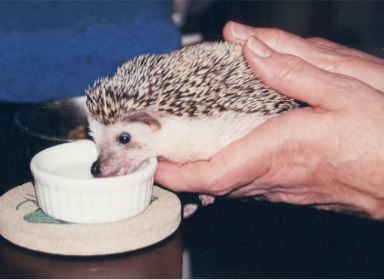
To date, several treatments for Wobbly Hedgehog Syndrome have been attempted with little or no success. WHS is not the same as Multiple Sclerosis. However they share similar symptoms which CBD therapy may reduce. You can read more about CBD uses for MS from the National Library of Medicine here.
Humans and animals benefit from cannabidiol daily. Cannabidiol has less than 0.3% THC and does not cause a “high” in humans or pets. It has been used in numerous pets to improve mobility, reduce fatigue, gain appetite, and stop muscle contractions. Please note, no specific studies are available regarding CBD usage in hedgehogs with WHS.
How much hedgehog CBD oil do I use?
For hedgehogs, the 150mg bottle is perfect. This size bottle lasts ten months at the rate of one drop per day. If necessary, the dosage can be increased to two drops per day after a week. Dropping it into their mouths by syringe, or placing it on their food is the easiest way to administer the oil. Many have even rubbed it into sore muscles or placed it directly on a tumor. It is best to follow the directions of a qualified veterinarian regarding appropriate usage.
For more information about what CBD pet drops can do for your pet hedgehog, please follow this link. If you use CBD for your pet hedgehog, please let us know by commenting below with your experience. Your positive experiences will help others that have a hedgehog showing illnesses and symptoms.
Other remedies attempted to cure Wobbly Hedgehog Syndrome:
- Vitamin E
- Vitamin B
- Selenium
- Calcionate Syrup
- Oral Predisone
- Antibiotics – Trimethoprim Sulfa, Amoxi-Drop Liquid, Baytril
- Homeopathics
- Acupuncture
- Physical Therapy
Research finds that remedies do not slow down the progression of the disease. At best, they merely improve the quality of remaining life.
The above information came from a study by The Association of Exotic Mammal Veterinarians.
Massage Therapy For Wobbly Hedgehog Syndrome
Hedgehog Illnesses and Symptoms of Cancer and Tumors
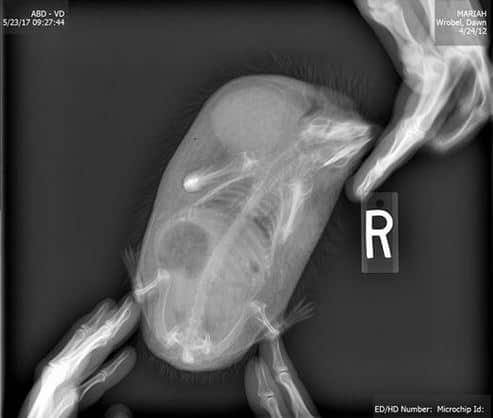
Abnormal cell growths are common in hedgehogs of any age, but more so between the ages of 3 and 4. Tumors can grow internally or externally. Additionally, the growths can appear anywhere on the body such as on/in the:
- Nasal Cavity (mouth, nasal passages, throat)
- Organs (liver, lungs, skin, uterus)
- Stomach
- Mammary Glands
The growths occur quickly, increasing in size sometimes overnight. The hedgehog signs and symptoms of cancer can often be difficult to spot or can even be hidden for a period of time.
Nasal Cavity Tumor Presence
Oral tumor signs and symptoms could be a swollen cheek, growth inside the mouth, and anywhere around the oral cavity. Sometimes these symptoms mimic tooth problems, with some hedgies leading to having all or some of their teeth removed. If your hedgehog experiences a decreased appetite, check inside their mouth or around their throat for signs and swelling.
Reproductive Organ Tumors

Of the possible reproductive tumors, uterine tumors are most common in hedgehogs. Additionally, ovarian and Penile tumors have occurred in rare cases. Signs of uterine, ovarian, or penis tumors would be abnormal secretions or an enlarged swollen stomach. Both the center for veterinary health and scientists recommend spaying young females. Because of the high risk of reproductive cancer, this is an avoidance measure before reproductive cancer can occur. Once it has, the tumor can often be removed.
Tali The Hedgehog Gets a Cancerous Tumor Removed
Hedgehog Fun Fact: A ten year old hedgehog is the equivalent to a one-hundred year old person.
Hedgehog Stomach Tumor Signs and Symptoms
Documents show that abnormal masses can grown in the stomach, the small and large intestines, as well as other parts of the digestive tract. Some hedgehog illnesses and symptoms that may indicate digestive tract cancer can include diarrhea, stool with mucus and red, black, or green color, inability or refusal to eat.
Signs and Symptoms of Mammary Gland Cancer
Unfortunately, you may witness that your hedgehog has harmed themselves by repetitively biting in one area. It has been documented that hedgehogs can gnaw at their chests when mammary cancer is present.
Other signs and symptoms include: Lethargy; Lack of appetite; Nose, ear, and chin crusts; Muscle paralysis; and Inability to ball
Illnesses Relating to Eyesight
Hedgehogs can have tumors behind their eye, ultimately causing blindness. They can also develop cataracts which is a clouding of their eye lens in one or both eyes. Cataracts can also cause blindness. Hedgehogs do not have good eyesight to begin with, but losing an eye can cause them to be off balance for a bit while adjusting to the loss of their sense completely. If your hedgie does go blind, it is important to keep their cage layout the same for them because they have an incredible memory of where things are like their wheel and hideaways. Also, gentle subtle movements are recommended to avoid scaring your hedgehog. Always let them know you are going to approach them or touch them first.
Learn about how to deal with a blind hedgehog here <<<
External and Internal Parasites
Internal Parasites
A major symptom of internal parasites includes diarrhea that lasts more than three days. These infections can be diagnosed with a fecal matter sample. Animals with this normally do not show any other signs of the parasites. However you should consider calling the after hours clinic if you see red, green, or black colored stool, and vomiting. Internal parasites are often treated with deworming medication.
External Parasites
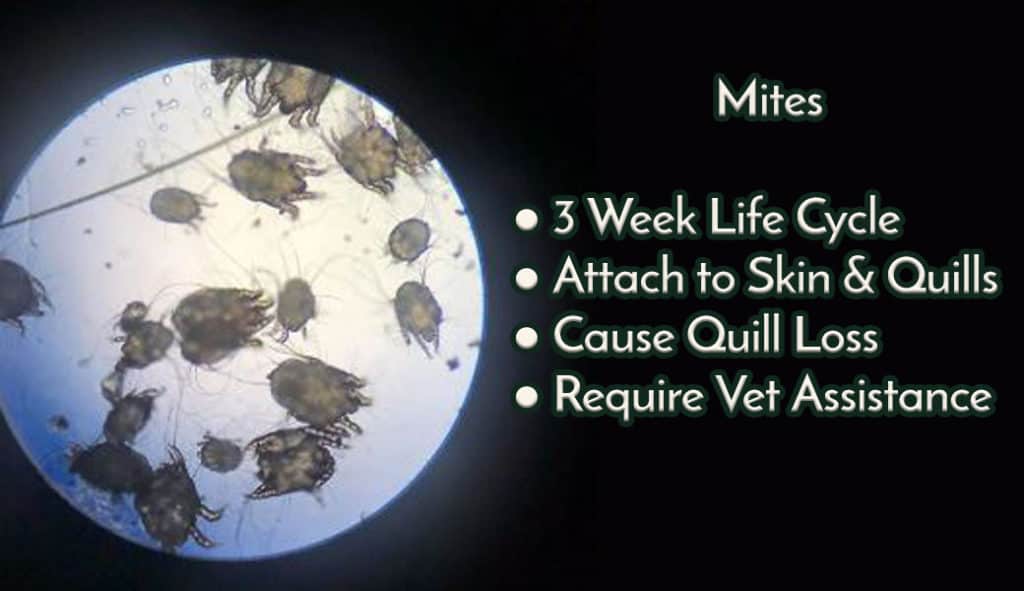
External parasites include: Fleas; Ticks; Mites; and Dermatitis
Mites
The Caparinia Tripolis is the most common mite found on hedgehogs. These mites can be examined running around the face, quills, forehead, and ears. They come from being in contact with another animal or from bedding and litter choices. Spine loss is a common sign of mites, as is flaking white skin, and crusts at the quill base. Ear mites are also possible, and signs and symptoms of these would be constant scratching of the ear.
Mites can cause an awful appearance in hedgehogs, creating the following side issues:
- Severe Mange (really aggressive crusty fungus in absence of hair)
- Secondary skin infections
- Ringworm (fungus)
Read more about mites in hedgehogs right here and discover how to over come them.
Hedgehogs With Ringworm
This skin disease is an infection that can be transferred to humans and other house pets. It is a fungus and not an actual worm. Missing quills in patches on the face or body can indicate this disease. The skin can appear rough and wrinkled like elbow skin. A skin scrape should be done to determine any present bacteria and the veterinarian will prescribe antibiotics and medicated shampoo to use.
Gastrointestinal Diseases
Salmonella
Salmonella is a gastrointestinal disease in hedgehogs that can be transferred to humans. It can start out as diarrhea then lead to dehydration and passing on if not treated. The S Tilene, S Typhimurium, and S Enteritidis strains of salmonella are commonly found in hedgehogs. The illness comes from their fecal matter which is easily spread everywhere given their messy bathroom habits. Salmonella will often cure itself but sometimes could need intervention. Children less than 5, seniors older than 65, and those with weakened immune systems should take extra care when handling hedgehogs. Anything in the hedgies environment can be effected and transmit.

Gastritis and Obstructions
Hedgehog pain and discomfort from their stomachs and bowels are frequently a result of giving the hedgehog dairy products, changing the hedgehog's diet, or by choosing a poor diet that was not rich in protein or was too much or little fat content. Ingesting fibers from their surroundings especially when they anoint is a danger factor to consider as well.
Fatty Liver Disease
Fatty Liver Disease can be caused by malnutrition, foods that were too high in protein, obesity, toxins, stress, kidney malfunction, or infection. It is also referred to as hepatic lipidosis and can also be the result of pregnancy, abnormal cell growth, WHS, and liver dysfunction.
Gastrointestinal Diseases Reported Without Traditional Signals
Hedgehogs with salmonella, esophagitis, enteritis, colitis, and ulcers did not show signs of diarrhea or vomiting, but showed a decrease in appetite and notable weight loss.
Find out what hedgehog poop can indicate to you about their health here in our research paper on the topic.
Hedgehog Fun Fact: A hedgie's digestive system does not rely on bacteria to digest food so there is no evidence of antibiotic sensitivity like in other mammals.
Hedgehog Signs and Symptoms of Pneumonia
Pneumonia in hedgehogs can be caused by lung worms, viruses, or bacteria. The same bacteria that causes kennel cough in dogs can effect a hedgehog's lungs. It is best to avoid taking your hedgehog to dog parks and exposing them to non-vaccinated pups. An ultrasound at the vet can determine the presence of pneumonia. Their noses should always be damp, never dry or too wet. Make sure this is not in response to an allergy in their environment.
Symptoms of respiratory infections in hedgehogs include: Nasal discharge; Difficulty breathing; Abnormal sneezing; Dry Noses
Urinary Tract Infections
Domesticated hedgehogs can develop urinary tract infections, yeast infections, cystitis (inflammation), and urolithiasis (stones). Signs and symptoms of urinary tract infections can include:
- Painful sounds the hedgie makes when urinating
- Thick discolored Urine
- Yellow thick discharge
- Constant urination
- Lack of appetite
- Lethargy
Interested in learning more about Hedgehog UTI symptoms and treatments? Read our research paper on it here!
Blood Infections Signs and Symptoms
Hedgehogs can get blood infections caused by other unsolved infections inside their body like pneumonia or complications with some of their organs. Because this illness comes on quickly and can be fatal, early intervention with antibiotics prescribed by a vet is vital.

Mr. Pokee the famous travelling hedgehog was diagnosed with a bacterial infection after dental surgery. Within three days he passed away leaving his owner and +120,000 followers heartbroken.
Possible Symptoms of a Blood Infection:
- Higher breathing rate
- Immobility
- Odd behavior
- Lethargy
Hedgehog Symptoms of Dental Diseases
Tarter, gingivitis, and periodontal disease happen in hedgehogs too. Their kibble is supposed to aid with cleaning their teeth. Hedgehog illnesses and symptoms of dental disease can be hidden sometimes, especially if your hog won't let you see inside their mouth. It has been suggested to take your hedgie to the vet for dental cleanings and screenings.
How to Avoid Hedgehog Dental Disease
- Avoid Canned Food
- Provide diet high in chitin and bone
- Brush your hedgehog's teeth
- Take hedgie in for for regular dental cleanings
When you take your hedgie for a dental screening, the vet will remove tarter and check their gums. If any tooth decay is present it must be dealt with to avoid toxins entering the hedgie's blood stream. Cavities and gingivitis left untreated could possibly cause a fatal infection beyond antibiotic help.
Symptoms of Hedgehog Dental Disease
- Excessive foamy saliva that smells
- Pawing at the mouth
- Tarter build up
- Crusty tooth stains
- Gum inflammation
- Recession of gum line
- Bald spot on the face with an inflammation
- Coughing
- Nasal discharge
- Loose teeth
- Poor appetite
Hedgehog Metabolic Bone Disease
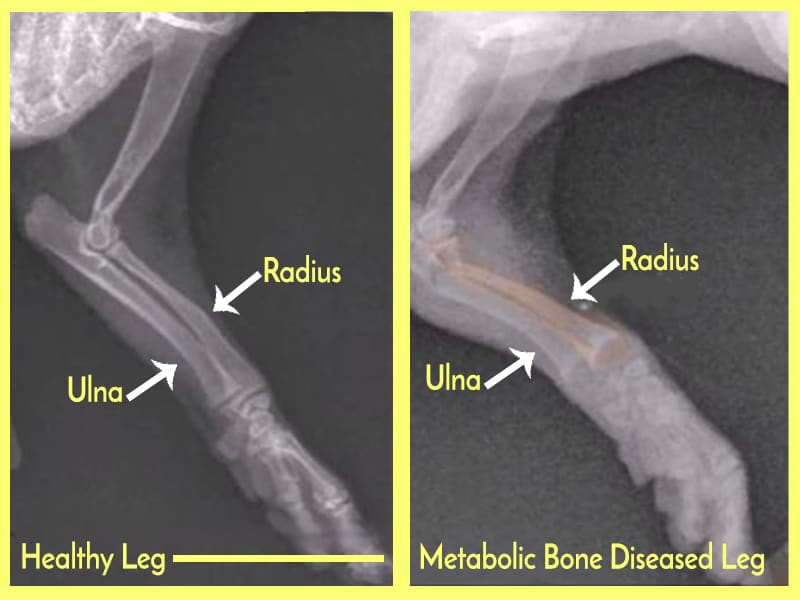
Recently we have been receiving reports of people concerned about feeding mealworms to their wild and pet hedgehogs. We soon uncovered an ongoing study and concern amongst wildlife rescuers, scientists, and nutritionists about an imbalance of calcium and phosphorus.
Calcium is pushed in our society as being the most important factor is strong and healthy bones. However, calcium and phosphorus need each other to create strong bone health. Everything you feed your hedgehog needs to have either a 1:1 or 2:1 Calcium to Phosphorus ratio, making popular feeder insects and other hedgehog treats no longer a good option to feed. We explained this in our feeder insect article which you can click here to read. Otherwise, their bodies deplete bones of calcium to make up for the deficiency in their blood, causing their bones to become weak and susceptible to fractures.
If a hedgehog is unable to walk, experiencing tremors, making sounds while they try to walk, unable to clot blood when injured, and over all becomes weak then its a good idea to get your hedgie in to your vet for an x-ray of their bones. Restoring the balance of calcium and phosphorus in their systems becomes extremely important, but there are no guarantees that the condition can be reversed. Metabolic bone disease is very painful and often results in the hedgies being put down.
Read our in-depth article on Metabolic Bone Disease in Hedgehogs here to learn how to prevent it.
Hedgehog Illnesses and Symptoms Conclusion
If you observe your hedgehog unusual behavior, we recommend that you write them down in a journal specific for your hedgehog's health. A hedgehog health journal is a valuable tool to show your hedgie's veterinarian if you suspect any type of hedgehog illnesses or symptoms. The most common symptoms among all diseases and illnesses appear to be:
- Loss of appetite
- Diarrhea
- Inflammation & bumps
- Strong odors
- Secretions
- Lack of interest in exercise
With the help of this article, we hope you can work with your vet and hedgehog community to determine what is happening and how you can help alleviate any stress your hedgehog may be under.
Discount Veterinarian Program

Caring for a hedgehog's illnesses can be rather expensive. We found a program that helps you save 25% every time you go to the vet. It can be for emergency visits, check ups, surgeries, and everything else. It's not insurance so any pet can enroll – even hedgehogs. There are no exclusions like there are with insurance policies. Hereditary illnesses and pre-existing conditions are not excluded from the discount plan. With all the possible hedgehog illnesses and symptoms, frequent veterinarian office visits are inevitable.
It's easy to use, just show your ID card at your participating vet's office for an automatic discount on your pet's vet visit. Every time. There's no claim form, and no limits on how much hedgehog and other pet owners can save. Use the discount card every time you go to the vet, you cannot over use it. Our recommended discount veterinarian plan is available in Canada, the United States, and Puerto Rico.
There is never a waiting period to enroll. And once enrolled, there are instant savings even if you have an appointment within the hour, if your vet is a participating treatment center. Also included in your membership with the vet bill discount program are:
- Lost pet recovery service
- $50 off pet sitting, boarding, and walking services
- 24/7 customer service support
Continued Suggested Learning
Will There Be Hedgehogs in Heaven? We certainly think animals have souls, and here's why!
Suffering from hives every time you hold your hedgehog? Come learn about hedgehog hives and discover how to prevent them!
Dealing with dry skin issues with your hedgehog? We have some great tips here for you to read!

